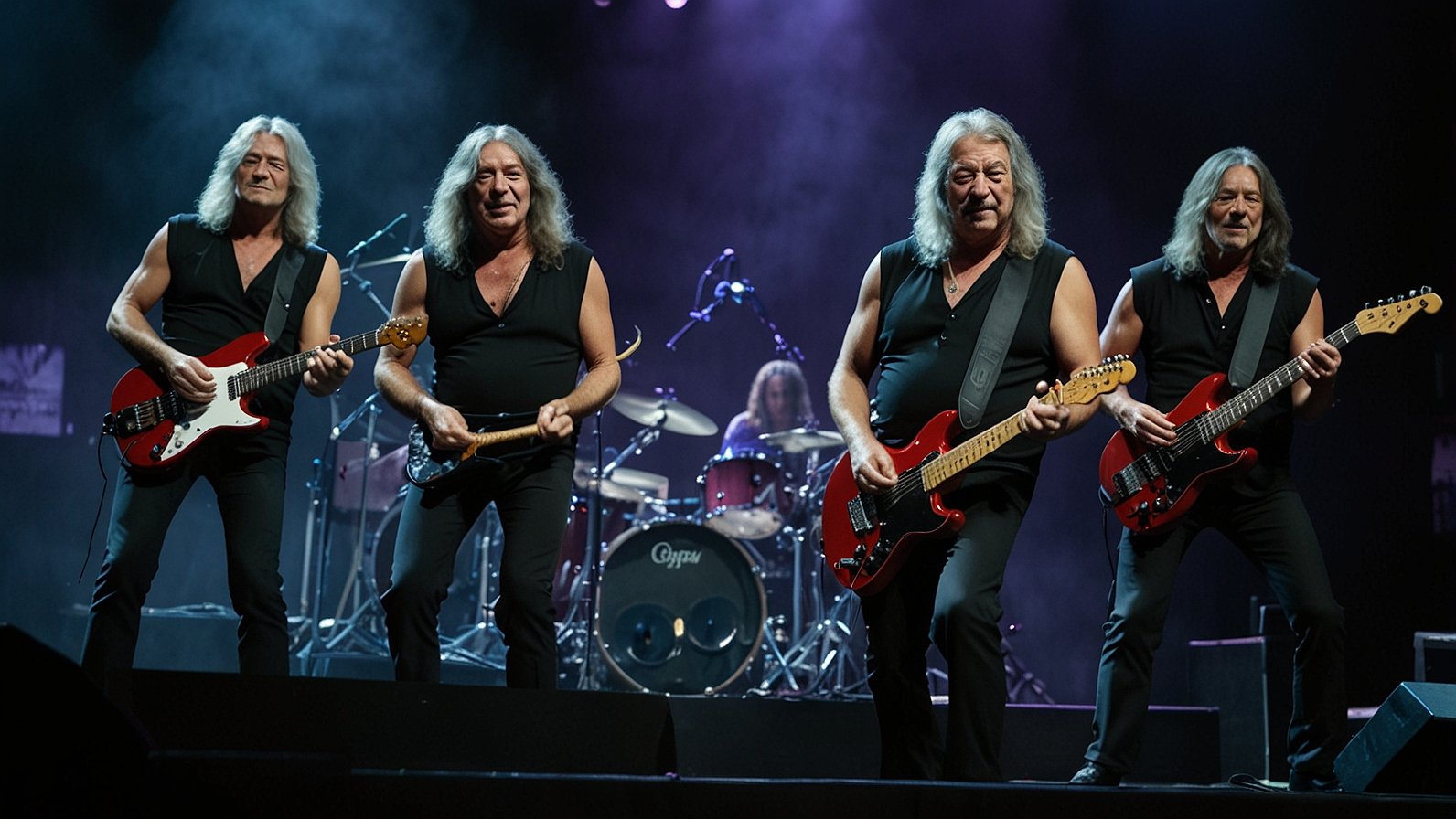Ever bought tickets for a legendary band’s “final tour ever,” only to see them announce another world trek just a few years later? If you felt a flicker of déjà vu when Deep Purple hit the road again after their big “farewell,” you’re not alone. Welcome to the curious case of the Deep Purple fake farewell tour – officially known as “The Long Goodbye.” Let’s dive into the rock ‘n’ roll marketing magic (and cheeky honesty) behind one of hard rock’s most enduring bands’ non-retirement retirement tour.
What Was Deep Purple’s “The Long Goodbye” Tour?
Simply put, “The Long Goodbye” was Deep Purple’s massive world tour spanning from 2017 to 2019. It was heavily promoted as the band’s final major global tour. Posters screamed “farewell,” ticket vendors used the “last chance” angle, and fans worldwide scrambled to catch the iconic Mk II lineup (Ian Gillan, Ian Paice, Roger Glover, Steve Morse, Don Airey) one last time.
- The Official Pitch: Promoters and marketing presented it as the band’s swan song, their final bow after over 50 years of rock.
- The Scale: It was a truly global undertaking, hitting continents and major cities, feeding into the “last chance” narrative.
- The Band’s Performance: True to form, Deep Purple delivered powerful shows night after night, playing classic hits like “Smoke on the Water,” “Highway Star,” and “Hush,” alongside deeper cuts. There was no hint of slowing down musically.
Why Did It Feel Like a Farewell?
Promoters leaned hard into the “final tour” angle. It’s a powerful motivator for ticket sales. Think about it: scarcity creates demand. The idea that “this is it” pushes fans off the fence. Media coverage amplified the farewell message. It was presented as a celebration of an incredible career, implying closure.
The “Fake” Part: Ian Gillan Spills the Tea
So, where does the “Deep Purple fake farewell tour” label come from? Straight from the horse’s mouth – or rather, the singer’s mic. Ian Gillan, Deep Purple’s iconic frontman, has been refreshingly candid in interviews since the tour wrapped.
- The Promoter’s Ploy: Gillan openly stated that the “farewell” concept was primarily a marketing strategy devised by promoters to boost ticket sales. It was a tactic, not a band decision rooted in retirement plans.
- Tongue Firmly in Cheek: Gillan revealed the band’s perspective on the name itself. He explained they approached “The Long Goodbye” title with a wink: “Let’s make the emphasis on ‘long’.” This hinted right from the start that it wasn’t going to be a quick exit.
- No Retirement Plans: Crucially, Gillan clarified there was never any serious intention within the band to retire after “The Long Goodbye” concluded. The band felt strong, enjoyed playing, and had no desire to stop.
Busted Myth: The biggest misconception is that Deep Purple tricked fans into thinking it was truly over. While the marketing pushed “farewell,” Gillan’s subsequent honesty reframed it as a clever, slightly cheeky promotion rather than a malicious deception. The band kept playing because they wanted to, not because they reneged on a promise.
Why Do Bands Do “Fake” Farewell Tours? The Business of Rock
The Deep Purple fake farewell tour is far from an isolated incident. It taps into a long-standing, if sometimes controversial, tradition in the music industry. Why does this happen?
- Boosting Ticket Sales: It’s the most straightforward reason. A “final tour” creates urgency and often leads to significantly higher ticket demand and sales than a standard tour announcement. Fear of Missing Out (FOMO) is a powerful driver.
- Reigniting Interest: For heritage acts, a farewell tour can generate massive media buzz, reintroduce them to casual fans, and remind everyone of their legacy. It’s a major event.
- Celebrating Legacy: Framing a tour as a “final bow” allows for a celebration of the band’s entire career, often attracting fans from multiple generations.
- Band Dynamics & Future Uncertainty: Sometimes, bands think it might be their last major tour due to age, health, or internal tensions. If things improve or the demand remains, they might simply decide to continue.
Real Farewell vs. “The Long Goodbye” Style Farewell
| Feature | A Genuine Farewell Tour | “The Long Goodbye” Style Farewell |
|---|---|---|
| Band’s Intent | Sincere plan to retire from major touring | No concrete retirement plans; focus on “long” |
| Marketing Driver | Announcement of retirement | “Last chance” angle to boost sales |
| Band Activity After | Truly stops touring (or drastically reduces) | Continues touring relatively soon after |
| Fan Expectation | Understood as a definitive end | Often feels like a marketing tactic in hindsight |
| Example | The Eagles “Long Road Out Of Eden” Final Tours? | Deep Purple, KISS (initial End of the Road?), Scorpions (initially) |
Deep Purple: The Tour That Never Ended
The proof is in the pudding. What happened after “The Long Goodbye” supposedly ended?
- The Tour Didn’t Actually End in 2019: While the intense global phase wrapped up, Deep Purple continued playing significant shows under different billing.
- New Music: They released the studio album “Whoosh!” in 2020, proving their creative engine was far from idle.
- Ongoing Tours: Deep Purple embarked on further European tours in 2022 and 2023, and announced more dates for 2024 and beyond. They never really stopped.
- Gillan’s Stance: Ian Gillan has consistently reiterated in interviews that as long as the band is healthy and enjoying it, they’ll keep playing. Retirement isn’t on the agenda.
The Legacy of “The Long Goodbye”
While the “farewell” tag was promotional, the tour itself was a massive success artistically. It showcased a band still at the top of their game, delivering electrifying performances of one of rock’s most influential catalogs. It allowed countless fans globally to experience their power live, perhaps for the first or the “last” time (or so they thought!). The “Deep Purple fake farewell tour” label, born from Gillan’s honesty, has become a humorous footnote in their epic history, highlighting the sometimes-absurd dance between art and commerce in rock music.
Navigating the “Farewell Tour” Landscape as a Fan
So, the next time you see a legendary band announce their “Final Tour Ever,” what should you do?
- Take a Deep Breath: Don’t panic-buy immediately out of pure FOMO. Do your research.
- Listen for Band Statements: Pay close attention to what the band members themselves actually say in interviews. Are they sounding definitive, or vague? Are they emphasizing “never say never” like Gillan did with “long”?
- Consider the Band’s History: Have they “retired” before? Are they still releasing new music and seeming vital?
- See Them Because You Want To: The best reason to buy a ticket is because you love the band and want to experience them live. Whether it’s their “last” tour or not becomes secondary to the power of the performance.
- Enjoy the Celebration: Even if it’s not truly the end, these tours often become fantastic celebrations of a band’s legacy, featuring deep cuts and a great atmosphere.
The Deep Purple fake farewell tour story ultimately reminds us that rock ‘n’ roll, at its core, is about the music and the performance. If the band is still firing on all cylinders and the audience is loving it, why stop? The show, as they say, must go on – even after the “long goodbye.”
What’s Your Take?
Did you see Deep Purple on “The Long Goodbye” tour? Were you surprised when they kept touring? Do you think farewell tours are clever marketing or misleading? Share your thoughts in the comments below!
You May Also Read: Oklahoma City Mesothelioma Lawyer Vimeo: Your Essential Guide to Legal Insights & Victim Support
FAQs
What was the official name of Deep Purple’s fake farewell tour?
It was officially called “The Long Goodbye World Tour” (2017-2019).
Why is it called the “Deep Purple fake farewell tour”?
Frontman Ian Gillan admitted the “farewell” aspect was a promoter’s marketing strategy to sell tickets, and the band never actually intended to retire after it. They’ve continued touring extensively.
Did Deep Purple say it was their final tour?
The marketing and promotion heavily implied it was their final major global tour. However, Gillan clarified later the band themselves emphasized the “long” in the title and didn’t plan to stop.
What did Ian Gillan say about the farewell label?
Gillan stated it was a promoter’s ploy, said the band focused on the word “long” (as in “let’s make the emphasis on ‘long'”), and confirmed there were no retirement plans.
Has Deep Purple toured since “The Long Goodbye” ended?
Yes, absolutely. They released an album (“Whoosh!”) in 2020 and have undertaken multiple European tours in 2022, 2023, and have dates scheduled for 2024 and beyond.
Is Deep Purple actually retiring soon?
Based on Ian Gillan’s recent statements and their continuous touring schedule, there is no indication of imminent retirement. They plan to keep playing as long as they are able and enjoy it.
Are other bands known for “fake” farewell tours?
Yes, using farewell tours as marketing tools is not uncommon. Bands like KISS (with their ongoing “End of the Road” tour starting in 2019) and The Scorpions (who announced a farewell in 2010 but kept touring) have faced similar discussions. The Eagles’ “Long Road Out Of Eden” farewell also extended for many years.










